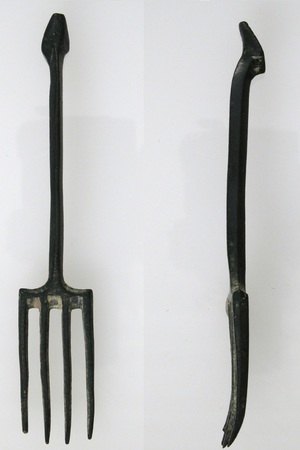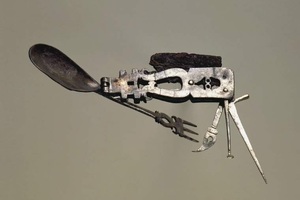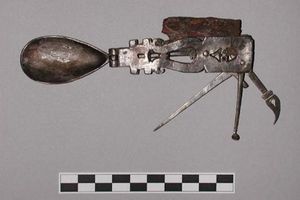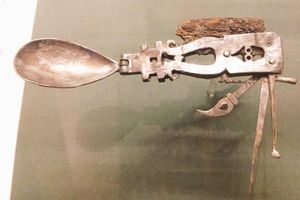Fork
A fork, also known as a furcula (Latin: furcula), is a metallic table utensil with several prongs. In ancient times, forks were made of iron or precious alloys such as copper, silver, or gold. Archaeologists have also discovered elaborately decorated forks, sometimes with folding mechanisms.
 A copper Roman fork. 12. 1x2. 1x0. 9 cm. Metropolitan Museum of Art, New York. No. 47.107.1 from the Rogers Foundation. 1st-4th century AD
A copper Roman fork. 12. 1x2. 1x0. 9 cm. Metropolitan Museum of Art, New York. No. 47.107.1 from the Rogers Foundation. 1st-4th century AD Bronze fork. Rome.. Length-14.9 cm. Walters Museum of Art, Baltimore. # 54.1447. 2nd-4th century AD
Bronze fork. Rome.. Length-14.9 cm. Walters Museum of Art, Baltimore. # 54.1447. 2nd-4th century AD Silver Roman fork-spoon. Length-16.2 cm. Metropolitan Museum of Art, New York. No. 2006.514.3. 3rd century AD
Silver Roman fork-spoon. Length-16.2 cm. Metropolitan Museum of Art, New York. No. 2006.514.3. 3rd century AD
The most intricate and finely decorated ancient forks belong to Roman civilization. During that time, folding mechanisms that combined spoons, forks, and other eating utensils became widespread.
 Roman folding "multi-tool", silver. Includes fork, spoon, knife and other tools. Fitzwilliam Museum, Cambridge. UK. 2-3 century AD
Roman folding "multi-tool", silver. Includes fork, spoon, knife and other tools. Fitzwilliam Museum, Cambridge. UK. 2-3 century AD Roman folding "multi-tool", silver. Includes fork, spoon, knife and other tools. Fitzwilliam Museum, Cambridge. UK. 2-3 century AD
Roman folding "multi-tool", silver. Includes fork, spoon, knife and other tools. Fitzwilliam Museum, Cambridge. UK. 2-3 century AD Roman folding "multi-tool", silver. Includes fork, spoon, knife and other tools. Fitzwilliam Museum, Cambridge. UK. 2-3 century AD
Roman folding "multi-tool", silver. Includes fork, spoon, knife and other tools. Fitzwilliam Museum, Cambridge. UK. 2-3 century AD
Related topics
Ancient military campaigns, Spoon, Dagger
 Roman folding "multi-tool", silver. Includes fork, spoon, knife and other tools. Fitzwilliam Museum, Cambridge. UK. 2-3 century AD
Roman folding "multi-tool", silver. Includes fork, spoon, knife and other tools. Fitzwilliam Museum, Cambridge. UK. 2-3 century AD






